The "Walking Tour: Civil Rights History – The Church, Children & Community" invites participants to uncover the profound connections between faith, youth activism, and community engagement during the Civil Rights Movement in Birmingham. As they explore historic sites like the 16th Street Baptist Church, they’ll encounter stories of courage and resilience that shaped a pivotal era. This tour not only highlights the contributions of young leaders and their faith communities but also raises questions about the ongoing impact of these events. What lessons can today’s communities draw from this rich history?
Good To Know
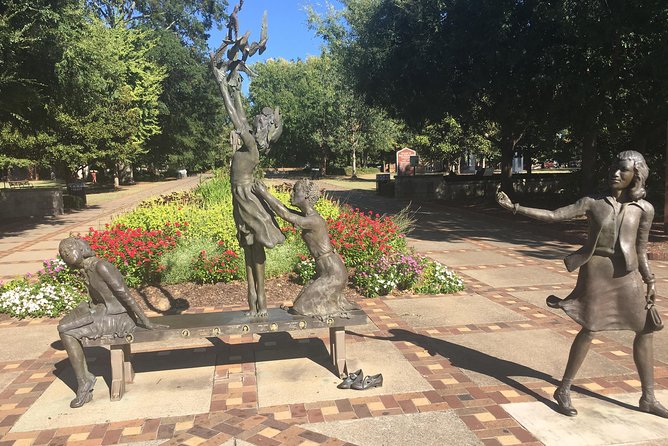
- The tour explores the pivotal role of churches as hubs for civil rights activism and community organization in Birmingham’s history.
- Children’s activism during the Civil Rights Movement showcased their significant impact, leading protests and reshaping societal perceptions of leadership.
- Key landmarks include the 16th Street Baptist Church and Kelly Ingram Park, highlighting the struggles and sacrifices made for equality.
- Community involvement through marches, sit-ins, and voter registration fostered solidarity and powerful networks among activists and citizens.
- Interactive activities enhance understanding of civil rights history, allowing participants to engage deeply with the stories of the church, children, and community.
Tour Overview
On this engaging Civil Rights History Walking Tour, participants dive into the profound legacy of Birmingham, Alabama, exploring the pivotal events and figures that shaped the struggle for equality.
This tour emphasizes the influential roles of church leaders and children in the Civil Rights Movement, providing unique insights into their contributions post-Civil Rights Act of 1964.
With a maximum group size of 12, travelers receive personalized attention from knowledgeable guides who passionately share stories of the past.
The experience includes interactive activities, fostering a deeper understanding of the historical context.
Meeting at 1601 5th Ave N, participants embark on a journey that not only educates but also inspires, ensuring a memorable exploration of Birmingham’s rich history.
You can also read our reviews of more walking tours in Birmingham
Key Landmarks
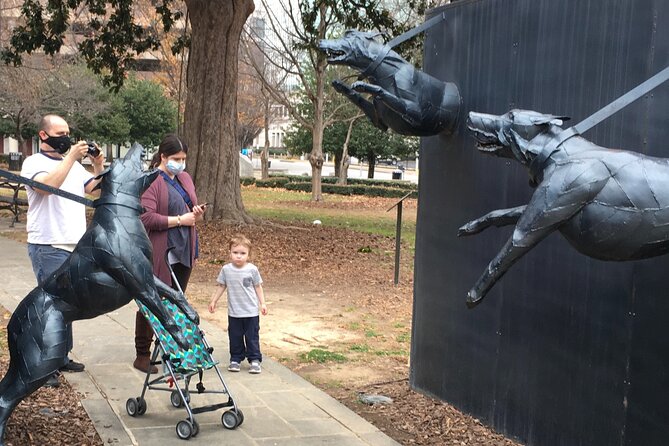
As participants explore Birmingham on the Civil Rights History Walking Tour, they’ll encounter key landmarks that serve as powerful reminders of the struggle for equality.
One of the most significant stops is the 16th Street Baptist Church, where a tragic bombing in 1963 claimed the lives of four young girls, igniting national outrage.
Nearby, Kelly Ingram Park stands as a symbol of resistance, featuring poignant sculptures and memorials dedicated to the movement. The park was a site of peaceful protests and police brutality, illustrating the harsh realities faced by activists.
These landmarks not only reflect the past but also inspire ongoing discussions about civil rights, making them essential stops on this enlightening journey through Birmingham’s rich history.
The Role of the Church
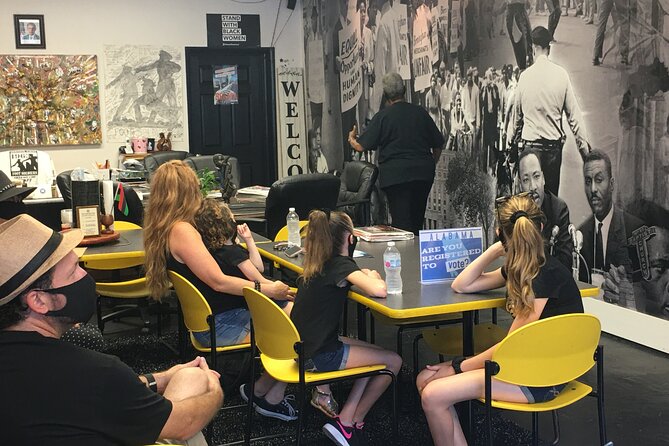
Throughout the Civil Rights Movement, churches served as vital hubs of community organization and activism, uniting individuals in their quest for justice. These religious institutions provided sanctuary and support, often becoming the meeting places for strategizing protests and marches.
Leaders like Dr. Martin Luther King Jr. emerged from these faith communities, using their platforms to inspire change and galvanize supporters. The church’s moral authority resonated with many, fostering a sense of purpose and community solidarity.
Plus, sermons often addressed social injustices, encouraging congregants to take action. By promoting nonviolent resistance and civil disobedience, the church played an essential role in shaping the movement, offering both spiritual guidance and practical resources to those seeking equality and justice.
Impact on Children
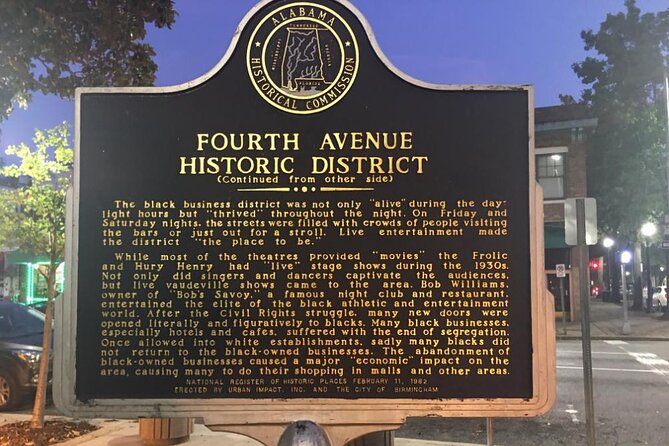
The involvement of children in the Civil Rights Movement marked a profound shift in the struggle for equality. Their courage and activism brought attention to the injustices faced by African Americans, inspiring a generation to join the fight. Children took part in protests, marches, and educational initiatives, demonstrating that their voices mattered.
-
They organized sit-ins and peaceful demonstrations.
-
Many faced violence and intimidation yet remained undeterred.
-
Their involvement highlighted the importance of youth in social change.
-
The impact of their actions continues to resonate, influencing contemporary movements.
These young activists not only challenged societal norms but also reshaped public perception, proving that age doesn’t limit the capacity for leadership and change.
Community Involvement
Community involvement played a pivotal role in the Civil Rights Movement, uniting individuals and organizations in a shared mission for equality. Local churches served as vital meeting places where community members gathered to strategize, organize protests, and educate one another about their rights.
Grassroots efforts, led by ordinary citizens, created powerful networks, fostering a sense of solidarity. Community involvement extended beyond the church, with citizens participating in marches, sit-ins, and voter registration drives, all aimed at dismantling systemic oppression.
Children and youth also played crucial roles, often becoming the face of protests and inspiring others to join the cause. This collective action not only advanced civil rights but also strengthened community bonds, leaving a lasting legacy that still resonates today.
You can also read our reviews of more historical tours in Birmingham
- 2.5-Hours Walking Tour of Birmingham Into Black Heritage Madiba
- Iconic Birmingham: A Journey Through Heart & Heritage
- Birmingham Gangs Nighttime Historical Walking Tour With Pub Stops
- Walking Tour: Civil Rights History -The Church, Children & Community
- Historical Highlights of Birmingham
- 1963 Birmingham Civil Rights Experience – Black History Matters Walking Tour
Tour Logistics
Exploring the rich history of the Civil Rights Movement is made easy with well-organized tour logistics that enhance the overall experience.
Participants can look forward to a seamless journey through Birmingham’s significant landmarks, with a maximum group size of 12 ensuring personalized attention.
Here are some key details:
- Meeting Point: 1601 5th Ave N, Birmingham, AL 35203 (30 minutes before tour).
- End Point: Returns to the meeting point for convenience.
- Transportation: Private transportation provided for comfort.
- Accessibility: Stroller accessible; service animals allowed; however, not wheelchair accessible.
This thoughtful planning allows travelers to focus on absorbing the impactful history without logistical worries, making the tour both enjoyable and enriching.
Health and Safety Guidelines
Ensuring a safe and enjoyable experience is a priority for participants on the Civil Rights History Walking Tour. The tour isn’t recommended for travelers with back problems, pregnant individuals, or those with serious medical conditions.
It’s essential for participants to possess a moderate level of physical fitness, as the tour involves walking and exploring significant historical sites. With a maximum group size of 12, the guides can provide personalized attention while maintaining safety protocols.
Travelers are encouraged to wear comfortable shoes and stay hydrated throughout the tour. By adhering to these health and safety guidelines, participants can fully engage with the rich history and impactful stories that shape Birmingham’s Civil Rights legacy.
Traveler Reviews and Experiences
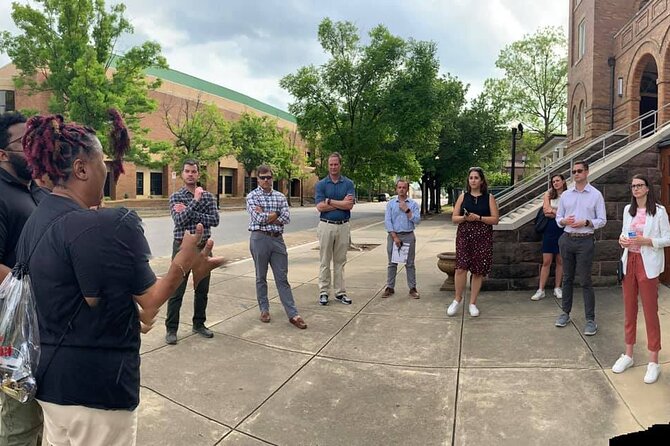
Many travelers have shared their experiences on the Civil Rights History Walking Tour, highlighting the profound impact it had on their understanding of the Civil Rights Movement.
Reviewers consistently praise the knowledgeable guides and the tour’s engaging format.
- Enthusiastic presentations that bring history to life
- Personal discussions that deepen connections with historical events
- Unique interactive activities, like creating protest signs
- A small group size that fosters meaningful interactions
Frequently Asked Questions
What Should I Wear for the Walking Tour?
For the walking tour, she should wear comfortable shoes suitable for walking, breathable clothing to stay cool, and a hat for sun protection. Layers are smart, as temperatures can change throughout the day.
Are Pets Allowed on the Tour?
Pets aren’t allowed on the tour. The organizers prioritize a comfortable experience for all participants, ensuring a focused environment. Service animals, however, are permitted, providing necessary support to those who need it during the tour.
Can I Take Photos During the Tour?
During the tour, participants can take photos freely. They’re encouraged to capture memorable moments and significant landmarks. The guide often highlights key spots, making it easy for everyone to document their experience effectively.
Is Food or Drink Provided?
Food or drink isn’t provided during the tour. Travelers are encouraged to hydrate and bring snacks if needed. The experience focuses on learning, so staying energized can enhance their enjoyment and engagement throughout.
What Happens if It Rains?
If it rains, the tour operates as scheduled, but participants should dress appropriately for weather conditions. Guides adapt the experience, ensuring everyone remains engaged and informed, regardless of the elements. Enjoyment and education still prevail!
The Sum Up
The "Walking Tour: Civil Rights History – The Church, Children & Community" in Birmingham provides a profound glimpse into the intertwined narratives of faith, youth activism, and community strength during the Civil Rights Movement. With visits to iconic landmarks and engaging discussions, participants leave with a richer understanding of the struggles and triumphs that shaped the fight for equality. This tour not only honors the past but also inspires continued commitment to justice and community solidarity today.
More Walking Tours in Birmingham
- Footlights & Felonies: A Walking Tour of Vaudeville, Film & Crime
- Alabama Art Walk: Birmingham District Bonanza Bash
- Birmingham Self Guided City Walk and Interactive Treasure Hunt
- Private Birmingham Ghosts and Gallows Walking Tour
- Birmingham Must-see Attractions Walking Tour With A Guide
- 2 Hour Private Walking Tour of Birmingham
More Tours in Birmingham
More Tour Reviews in Birmingham
Not for you? Here's more nearby things to do in Birmingham we have reviewed
- Taste of Tuscaloosa, Brewery Tasting Tour
- Birmingham Civil Rights Scavenger Interactive Hunt Activity
- Tuscaloosa Bar Golf Pub Crawl
- Tuscaloosa Boutiques Tour
- VIP “TwentyFun” Birthday Tour
- Pokémon GO Tour
- Footsteps to Freedom Self-Guided Tour Through Birmingham
- Historical Golf Cart Tour of Tuscaloosa Landmarks
- Footlights & Felonies: A Walking Tour of Vaudeville, Film & Crime
- Alabama Art Walk: Birmingham District Bonanza Bash
- University Scavenger Hunt: University of Alabama Adventure
- Super City Birmingham Hop On Hop Off Driving App Tour
